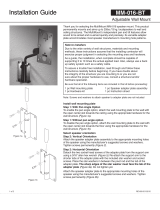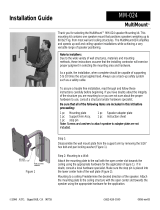
4
TD-000498-00-A
Using Yoke Mounts
The SR-5152 can be installed using a third-party yoke mount attached to the
M10 Integrated Suspension Points. A 6 mm hex key is required.
WARNING!:
Consult a structural engineer before mounting
the Yoke Mounts to any surface. Be sure the surface can
support the weight of the loudspeaker, and that the proper
bolts are used to secure the yoke to the surface.
1. Properly secure the yoke mount bracket to the selected surface.
Refer to Figure 1
2. Remove the center M10 hex plugs (4) from the top and bottom of the
loudspeaker enclosure. You may discard or recycle the plugs.
3. Using proper lifting techniques place the loudspeaker in the yoke with the
two circular pads (5) between the loudspeaker enclosure and the yoke.
4. Install the M10 socket head cap screw (1), lock washer (2), and flat
washer (3) through the yoke and pad, and into the Integrated Suspension point. Repeat for the other end of the loudspeaker enclosure. Do not
fully tighten the screws at this point.
5. Adjust the angle of the loudspeaker as required.
6. To prevent rattling in a vertical orientation, install the two rectangular pads between the loudspeaker enclosure and the yoke mount.
NOTE:
If you reposition the loudspeaker be sure to check that the rectangular pads are in the proper positions.
7. Torque the M10 cap screws to 69 kgf/cm (60 in/lbs).
Using Wall Brackets
The SR-5152 can be installed using a third-party multi-
mount wall bracket attached to the four (4) M8 threaded
inserts on the back of the loudspeaker enclosure.
WARNING!:
Consult a structural engineer
before mounting any wall mount to any
surface. Be sure the surface can support
the weight of the loudspeaker, and that the
proper bolts are used to secure the bracket
to the surface.
Refer to Figure 2
1. Follow the bracket manufacturer’s installation
instructions. Pre-install wall-side bracket part if instructed
to do so.
2. Remove the four M8 socket-head cap screws, lock washers, and flat washers from the rear panel of the loudspeaker enclosure.
3. Align bracket and re-install the four M8 socket head cap screws (5), lock washers (4), and flat washers (3) through the bracket plate (2), and into
the threaded inserts.
4. Torque the M8 cap screws to 138 kgf/cm (120 in/lbs).
5. Install loudspeaker with speaker-side bracket part attached onto wall, per bracket manufacturer’s instructions.
— Figure 1 —
1
5
2
3
— Figure 2 —
1
2
3 4 5
175 mm
(6.9 in)
87 mm
(3.4 in)
326 mm
(12.8 in)











